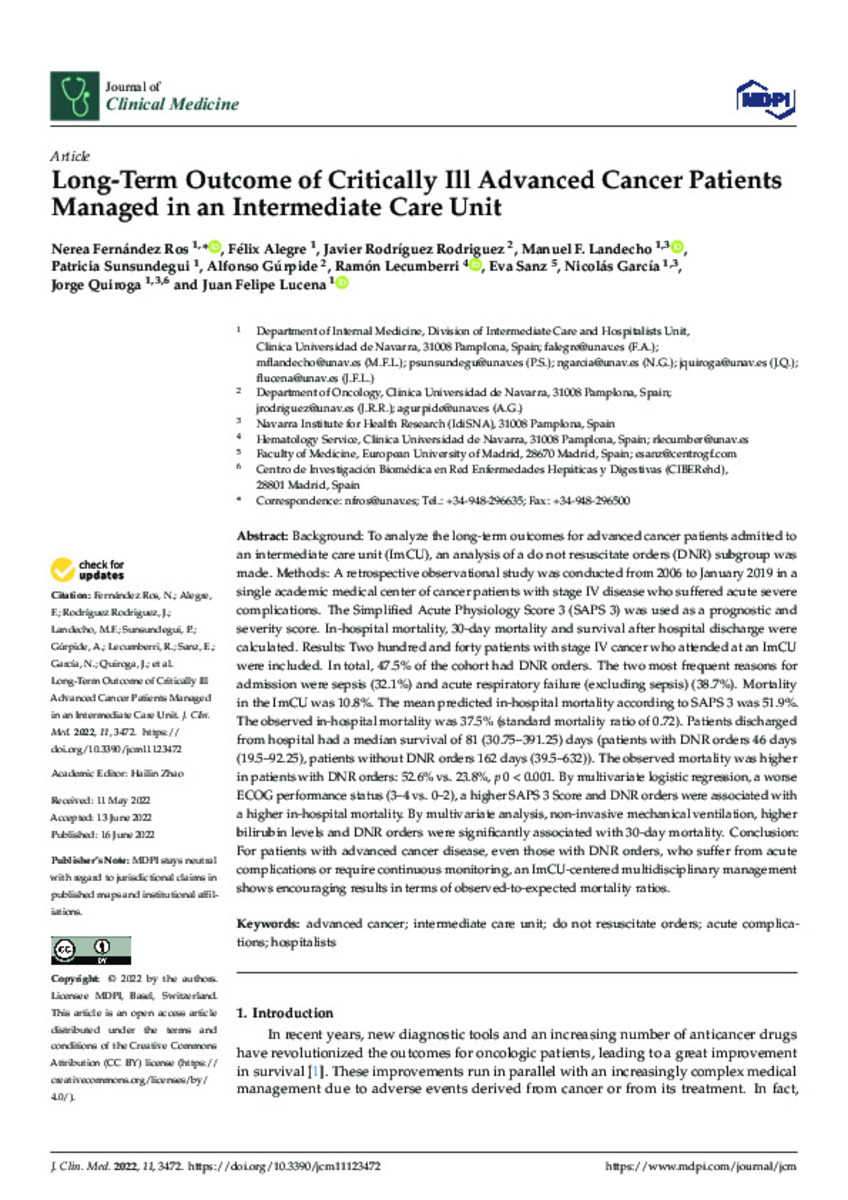Full metadata record
| DC Field | Value | Language |
|---|---|---|
| dc.creator | Fernandez-Ros, N. (Nerea) | - |
| dc.creator | Alegre, F. (Félix) | - |
| dc.creator | Rodríguez-Rodríguez, J. (Javier) | - |
| dc.creator | Landecho, M.F. (Manuel F.) | - |
| dc.creator | Sunsundegui-Seviné, P. (Patricia) | - |
| dc.creator | Gurpide, A. (Alfonso) | - |
| dc.creator | Lecumberri, R. (Ramón) | - |
| dc.creator | Sanz, E. (Eva) | - |
| dc.creator | Garcia-Gonzalez, N. (Nicolás) | - |
| dc.creator | Quiroga, J. (Jorge) | - |
| dc.creator | Lucena-Ramírez, J.F. (Juan Felipe) | - |
| dc.date.accessioned | 2023-04-14T06:17:07Z | - |
| dc.date.available | 2023-04-14T06:17:07Z | - |
| dc.date.issued | 2022 | - |
| dc.identifier.citation | Fernández-Ros, N. (Nerea); Alegre-Garrido, F. (Félix); Rodríguez-Rodríguez, J. (Javier); et al. "Long-term outcome of critically III advanced cancer patients managed in an intermediate care unit". Journal of Clinical Medicine. 11 (12), 2022, 3472 | es |
| dc.identifier.issn | 2077-0383 | - |
| dc.identifier.uri | https://hdl.handle.net/10171/65910 | - |
| dc.description.abstract | Background: To analyze the long-term outcomes for advanced cancer patients admitted to an intermediate care unit (ImCU), an analysis of a do not resuscitate orders (DNR) subgroup was made. Methods: A retrospective observational study was conducted from 2006 to January 2019 in a single academic medical center of cancer patients with stage IV disease who suffered acute severe complications. The Simplified Acute Physiology Score 3 (SAPS 3) was used as a prognostic and severity score. In-hospital mortality, 30-day mortality and survival after hospital discharge were calculated. Results: Two hundred and forty patients with stage IV cancer who attended at an ImCU were included. In total, 47.5% of the cohort had DNR orders. The two most frequent reasons for admission were sepsis (32.1%) and acute respiratory failure (excluding sepsis) (38.7%). Mortality in the ImCU was 10.8%. The mean predicted in-hospital mortality according to SAPS 3 was 51.9%. The observed in-hospital mortality was 37.5% (standard mortality ratio of 0.72). Patients discharged from hospital had a median survival of 81 (30.75-391.25) days (patients with DNR orders 46 days (19.5-92.25), patients without DNR orders 162 days (39.5-632)). The observed mortality was higher in patients with DNR orders: 52.6% vs. 23.8%, p 0 < 0.001. By multivariate logistic regression, a worse ECOG performance status (3-4 vs. 0-2), a higher SAPS 3 Score and DNR orders were associated with a higher in-hospital mortality. By multivariate analysis, non-invasive mechanical ventilation, higher bilirubin levels and DNR orders were significantly associated with 30-day mortality. Conclusion: For patients with advanced cancer disease, even those with DNR orders, who suffer from acute complications or require continuous monitoring, an ImCU-centered multidisciplinary management shows encouraging results in terms of observed-to-expected mortality ratios. | - |
| dc.language.iso | en | - |
| dc.rights | info:eu-repo/semantics/openAccess | - |
| dc.subject | Advanced cancer | - |
| dc.subject | Intermediate care unit | - |
| dc.subject | Do not resuscitate orders | - |
| dc.subject | Acute complications | - |
| dc.subject | Hospitalists | - |
| dc.title | Long-term outcome of critically III advanced cancer patients managed in an intermediate care unit | - |
| dc.type | info:eu-repo/semantics/article | - |
| dc.description.note | This article is an open access article distributed under the terms and conditions of the Creative Commons Attribution (CC BY) license | - |
| dc.identifier.doi | 10.3390/jcm11123472 | - |
| dadun.citation.number | 12 | - |
| dadun.citation.publicationName | Journal of Clinical Medicine | - |
| dadun.citation.startingPage | 3472 | - |
| dadun.citation.volume | 11 | - |
Files in This Item:
Statistics and impact
Items in Dadun are protected by copyright, with all rights reserved, unless otherwise indicated.






